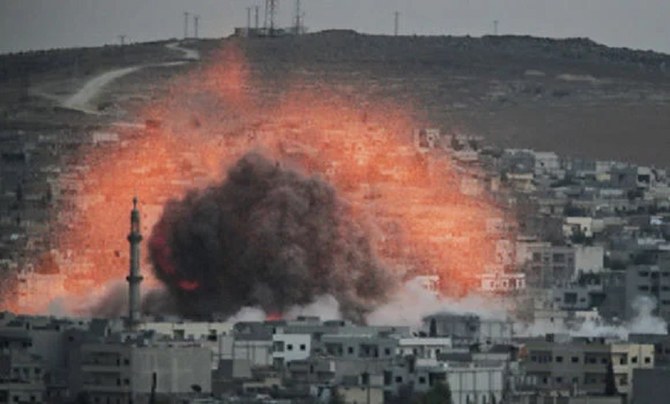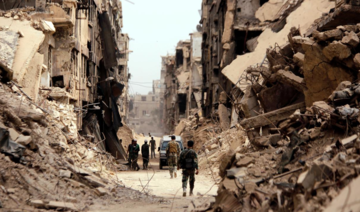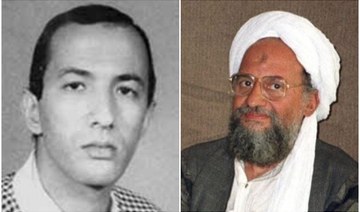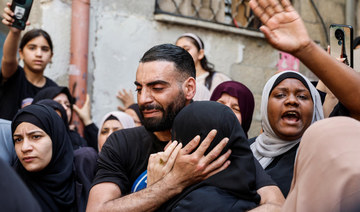WASHINGTON/BEIRUT: The United States launched airstrikes in Syria on Thursday, targeting facilities near the Iraqi border used by Iranian-backed militia groups.
US defense officials announced the strikes without providing details and with no mention of casualties, saying only that they were retaliation for a rocket attack in Iraq earlier this month that killed one civilian contractor and wounded a US service member and other coalition troops.
The Syrian Observatory for Human Rights (SOHR) said Friday that at least 17 pro-Iran fighters were killed in the US strikes in Syria at the Iraq border overnight.
“The strikes destroyed three lorries carrying munitions... There were many casualties. Preliminary indications are that at least 17 fighters were killed, all members of Popular Mobilization Forces,” the director of the SOHR, Rami Abdul Rahman, told AFP, referencing the powerful coalition of pro-Iran Iraqi paramilitaries.
The airstrike was the first military action undertaken by the Biden administration, which in its first weeks has emphasized its intent to put more focus on the challenges posed by China, even as Mideast threats persist.
Biden’s decision to attack in Syria did not appear to signal an intention to widen US military involvement in the region but rather to demonstrate a will to defend US troops in Iraq.
“I’m confident in the target that we went after, we know what we hit,” Defense Secretary Lloyd Austin told reporters flying with him from California to Washington.
Speaking shortly after the airstrikes, he added, “We’re confident that that target was being used by the same Shia militants that conducted the strikes,” referring to a Feb. 15 rocket attack in northern Iraq that killed one civilian contractor and wounded a US service member and other coalition personnel.
Austin said he recommended the action to Biden.
“We said a number of times that we will respond on our timeline,” Austin said. “We wanted to be sure of the connectivity and we wanted to be sure that we had the right targets.”
Earlier, Pentagon spokesman John Kirby said the US action was a “proportionate military response” taken together with diplomatic measures, including consultation with coalition partners.
“The operation sends an unambiguous message: President Biden will act to protect American and coalition personnel,” Kirby said. “At the same time, we have acted in a deliberate manner that aims to deescalate the overall situation in eastern Syria and Iraq.”
Kirby said the US airstrikes “destroyed multiple facilities at a border control point used by a number of Iranian- backed militant groups,” including Kataib Hezbollah and Kataib Sayyid Al-Shuhada. The US has blamed Kataib Hezbollah for numerous attacks targeting US personnel and interests in Iraq in the past.
Further details were not immediately available.
Mary Ellen O’Connell, a professor at Notre Dame Law School, criticized the US attack as a violation of international law.
“The United Nations Charter makes absolutely clear that the use of military force on the territory of a foreign sovereign state is lawful only in response to an armed attack on the defending state for which the target state is responsible,” she said. “None of those elements is met in the Syria strike.”
Biden administration officials condemned the Feb. 15 rocket attack near the city of Irbil in Iraq’s semi-autonomous Kurdish-run region, but as recently as this week officials indicated they had not determined for certain who carried it out. Officials have noted that in the past, Iranian-backed Shiite militia groups have been responsible for numerous rocket attacks that targeted US personnel or facilities in Iraq.
Kirby had said Tuesday that Iraq is in charge of investigating the Feb. 15 attack.
“Right now, we’re not able to give you a certain attribution as to who was behind these attacks, what groups, and I’m not going to get into the tactical details of every bit of weaponry used here,” Kirby said. “Let’s let the investigations complete and conclude, and then when we have more to say, we will.”
A little-known Shiite militant group calling itself Saraya Awliya Al-Dam, Arabic for Guardians of Blood Brigade, claimed responsibility for the Feb. 15 attack. A week later, a rocket attack in Baghdad’s Green Zone appeared to target the US Embassy compound, but no one was hurt.
Iran this week said it has no links to the Guardians of Blood Brigade.
The frequency of attacks by Shiite militia groups against US targets in Iraq diminished late last year ahead of President Joe Biden’s inauguration, though now Iran is pressing America to return to Tehran’s 2015 nuclear deal.
The US under the previous Trump administration blamed Iran-backed groups for carrying out the attacks. Tensions soared after a Washington-directed drone strike that killed top Iranian Gen. Qassem Soleimani and powerful Iraqi militia leader Abu Mahdi Al-Muhandis last year.
Trump had said the death of a US contractor would be a red line and provoke US escalation in Iraq. The December 2019 killing of a US civilian contractor in a rocket attack in Kirkuk sparked a tit-for-tat fight on Iraqi soil that brought the country to the brink of a proxy war.
US forces have been significantly reduced in Iraq to 2,500 personnel and no longer partake in combat missions with Iraqi forces in ongoing operations against the Daesh group.



























